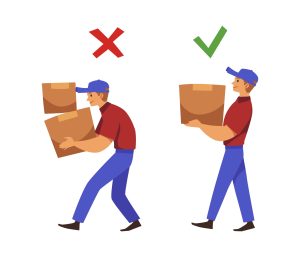You may be wondering whether you could make a manual handling injury compensation claim after being injured at work. If so, this guide will explain the criteria your case must meet in order to have a valid manual handling injury claim, and the duty of care your employer owes you while at work.
After this, we discuss some ways that a breach of this duty of care could lead to a manual handling accident, and whether they could lead you to claim compensation for the injuries suffered. Additionally, we will also set out the different heads of loss that could form your compensation settlement as well as provide information on how compensation may be calculated in successful personal injury claims.
After this, we explain the evidence that you could use to support your claim. Furthermore, we will look at how manual handling injuries in the workplace could be avoided. Personal injury claim time limits are also clearly explained. In the final section, we outline the advantages of working with a solicitor from our panel under a No Win No Fee agreement.
You can also contact our advisors with any questions you have and to check the eligibility and your claim. We’re available 24/7to give you free legal advice:
- You can call us on 0208 050 2736
- You can ask a question using the live chat pop-up.
- Or, you can complete our ‘claim online‘ form to receive a callback.
Choose A Section
- When Can I Claim For A Manual Handling Accident?
- When Could Employer Negligence Lead To A Manual Handling Injury Claim?
- What Risk Factors Should Be Considered When Performing Manual Handling?
- How Much Compensation For A Manual Handling Injury Compensation Claim Could I Receive?
- What Evidence Could Be Used When Claiming For Manual Handling Injuries?
- What Can Be Done To Prevent Manual Handling Injuries At Work?
- Is There A Time Limit For Claiming For A Manual Handling Injury?
- Does Making A No Win No Fee Claim Come With Any Benefits?
- Learn More About Making A Manual Handling Injury Compensation Claim
When Can I Claim For A Manual Handling Accident?
All employers owe their workers a duty of care as outlined by the Health and Safety at Work etc Act 1974 (HASAWA). It requires employers to take reasonable and practicable steps to prevent employees from experiencing harm as they perform their work duties. This could include ensuring all staff have received sufficient training and providing personal protective equipment (PPE) when needed.
In addition to this, the Manual Handling Operations Regulations 1992 requires employers to carry out risk assessments on all manual handling tasks that pose a risk of injury.
To be eligible to make a manual handling injury compensation claim, you must ensure that you can prove the following:
- A duty of care was owed to you by your employer.
- This duty of care was breached.
- As a result, you suffered harm.
A breach in a duty of care that leads to an injury is referred to as negligence.
Contact our advisors today to see whether you may have a valid manual handling injury claim.
When Could Employer Negligence Lead To A Manual Handling Injury Claim?
There are various ways that manual handling accidents could occur within the workplace. However, in order to have a valid claim, negligence must have occurred.
Some examples of accidents that may lead to manual handling claims include:
- Despite raising your concerns, your employer asks you to carry a load or object that is too heavy, large or difficult to grasp. Due to this, you drop the load onto your foot and suffer a toe injury such as a break or fracture.
- Due to a colleague being off work sick, your employer makes you carry a load that needs to be handled by two employees on your own. This causes you to suffer a strain in your back as well as a hand injury.
- Your employer asks you to carry a load, despite knowing that you have not received any manual handling training. Due to poor lifting technique, you suffer a back injury.
To check if you have valid grounds to make a personal injury claim, you can contact our advisors.
What Risk Factors Should Be Considered When Performing Manual Handling?
The Health and Safety Executive (HSE) are Britain’s national regulator for health and safety in the workplace. They provided examples of risks that should be considered before a manual handling task is performed. These include:
- How far the load is being lifted, carried or lowered.
- The weight of the load.
- The worker’s fitness, strength and any underlying medical conditions.
- Whether the work area is safe – e.g. is the area cramped? Are the floor surfaces poor? Is there sufficient lighting?
If your employer failed to carry out any risk assessments before requiring you to perform a manual handling task, you may be eligible to make a compensation claim for the injuries you suffered.
To see whether you may have a valid personal injury claim, or to ask any questions about the manual handling injury claims process, you can contact our advisors.
How Much Compensation For A Manual Handling Injury Compensation Claim Could I Receive?
Two heads of loss could form the settlement of a successful manual handling injury compensation claim. The first one is general damages, and it is awarded in all successful cases. This compensates you for the psychological and physical harm you have suffered.
Those calculating your personal injury compensation may refer to the Judicial College Guidelines (JCG) alongside any medical evidence. This provides compensation guidelines for a range of injuries, and we have used some of these in our table below. Please only refer to them as a guide. The first entry of this table has not been taken from the JCG.
Compensation Guidelines
| Location of Injury | Severity | Award Bracket | Notes |
|---|---|---|---|
| Multiple Severe Injuries and Special Damages | Severe | Up to £500,000 plus | Cases where there are multiple severe types of injury and associated special damages awarded to acknowledge the loss in earnings from time off work, care costs and medical expenses. |
| Back | (a) Severe (i) | £91,090 to £160,980 | The most severe injury types impacting the spinal cord and nerve roots. There is a combination of severe pain and disability alongside incomplete paralysis and other issues. |
| Neck | (a) Severe (ii) | £65,740 to £130,930 | Serious fractures or disc damage in the cervical spine causing considerably severe and permanent damage to the brachial plexus. |
| Hand | (b) Serious Damage To Both Hands | £55,820 to £84,570 | These injuries create a permanent cosmetic disability and a significant level of lost function. |
| Hand | (f) Severe Fractures to Fingers | Up to £36,740 | This bracket looks at injuries which lead to partial amputations and may result in impaired grip, deformity and reduction in mechanical function. |
| Wrist | (a) Complete Function Loss | £47,620 to £59,860 | Injuries that create a total loss of function in the wrist. |
| Shoulder | (a) Severe | £19,200 to £48,030 | Cases of injuries that are often associated with the neck and result in serious brachial plexus damage. |
| Shoulder | (c) Moderate | £7,890 to £12,770 | This bracket includes frozen shoulder issues that severely limit movement for approximately 24 months. |
| Pelvis/ Hip | (b) Moderate (i) | £26,590 to £39,170 | Significant injuries to the pelvis or hip but the threat of any permanent disability is not considered to be major, nor a great risk of such in the future. |
| Elbow | (b) Less Severe Injury | £15,650 to £32,010 | Injuries that cause impaired function but do not involve any significant disability or demand any major surgery. |
| Foot | (f) Moderate | £13,740 to £24,990 | Metatarsal fractures that are displaced and cause continuing symptoms and result in a permanent deformity. |
What Financial Losses Am I Able To Claim For?
The second head of loss that could form your compensation settlement is known as special damages. This provides you with compensation for the out-of-pocket expenses and losses that you have suffered due to your injuries.
Some examples could include:
- Medical expenses, such as paying for prescriptions or physiotherapy.
- A loss of earnings due to taking time off work.
- The cost of care if you require an at-home carer.
To include special damages in your claim, it will be necessary to present documented proof of these losses. This could include bank statements, invoices and payslips, for example.
To see whether a solicitor on our panel could help you with gathering this evidence for your manual handling injury claim, you can contact our advisors. They could also help answer any questions you may have about the manual handling claims process.
What Evidence Could Be Used When Claiming For Manual Handling Injuries?
All manual handling accident claims will need sufficient evidence that demonstrates the injuries suffered and how an employer was liable for them. Some examples of evidence you could gather to support your case could include, but are not limited to:
- Any workplace CCTV footage that clearly showed the accident.
- Witness statements from anyone who saw what happened as they could provide a statement later on.
- Photographs of your visible injuries and the scene of the accident.
- Medical evidence of the injuries you suffered, such as X-rays and your medical records.
A personal injury solicitor from our panel can lend valuable insight and support through all stages of the claiming process, particularly with collecting evidence.
If you would like to see if they could help you with your manual handling injury compensation claim, please contact our advisors.
What Can Be Done To Prevent Manual Handling Injuries At Work?
There are various ways that employers can play a part in preventing an accident in the workplace. Conducting a risk assessment prior to asking employees to carry out manual handling operations is only one example.
The HSE provide guidance on ways to reduce the risk of injury for manual handling tasks. These include:
- Breaking up larger loads into smaller ones.
- Ensuring all staff have received proper manual handling training.
- Make loads lighter, smaller or easier to grasp.
- Make sure the work environment is suitable for the task, e.g. sufficient flooring and lighting.
- Changing the work routine to avoid tight deadlines and excessive work rates.
If you would like to know whether you could be eligible to make a manual handling compensation claim following an accident at work, you can contact one of the advisors on our team.
Is There A Time Limit For Claiming For A Manual Handling Injury?
All personal injury claims have a time limit of three years as laid out in the Limitation Act 1980. The time limit typically starts from the date the accident occurred. However, under certain circumstances, exceptions can apply.
For example, injured persons who are under the age of 18 cannot pursue a claim themselves. A litigation friend might be appointed to act on their behalf by the courts during this pause. In the absence of any claim being made for them, the person will have three years to start a claim for themself from their 18th birthday.
If the injured party lacks the mental capacity to begin the claiming process, the time limit is frozen. A litigation friend could make a claim for them during this freeze. Should their mental capacity return and no claim has been made on their behalf, the three-year period starts from the recovery date.
Speak to our team with any questions you have about the personal injury claims time limit. They can also offer you free advice for your manual handling injury compensation claim.
Does Making A No Win No Fee Claim Come With Any Benefits?
Provided that you have a valid claim, one of the solicitors on our panel could help you with your case. There are many advantages to working with a solicitor on your claim, including:
- Assistance with gathering evidence.
- Ensuring your claim is filed within the time limit.
- Having any legal jargon explained to you.
- Negotiating a settlement on your behalf.
Additionally, the solicitors on our panel generally offer their services to their clients on a No Win No Fee basis. The type of agreement they typically offer is a Conditional Fee Agreement (CFA). Some of the advantages that come with working with a solicitor under a CFA include:
- No service fees to pay upfront for them to begin working on your claim.
- No service fees to pay while the claim moves ahead.
- Not having to pay for their work if the claim is unsuccessful.
- Your solicitor takes a legally capped percentage amount of your compensation as a success fee if your claim has been successful.
Contact US
To have the eligibility of your manual handling injury compensation claim checked, you can contact our advisors. If they deem you to have a strong case, they could put you in contact with one of the No Win No Fee solicitors on our panel.
To connect with them today, you can:
- Call 0208 050 2736
- Ask a question using the live chat pop-up.
- Or, you can complete our ‘claim online‘ form to receive a callback.
Learn More About Making A Manual Handling Injury Compensation Claim
Below, you find more of our guides on related topics:
- Guidance if you have been injured by a moving object at work, and when you could make a claim.
- Here we explore how to make factory accident claims with a personal injury solicitor.
- Information regarding the most common cause of injury at work and when you may have a valid claim.
Some external resources:
- This guide looks at back pain from the NHS.
- Also, to learn about types of reportable incidents in the workplace, visit this HSE link.
- When could claim statutory sick pay (SSP) from Gov.UK.
Please get in touch with our advisors for any other questions or queries about your manual handling injury compensation claim.




